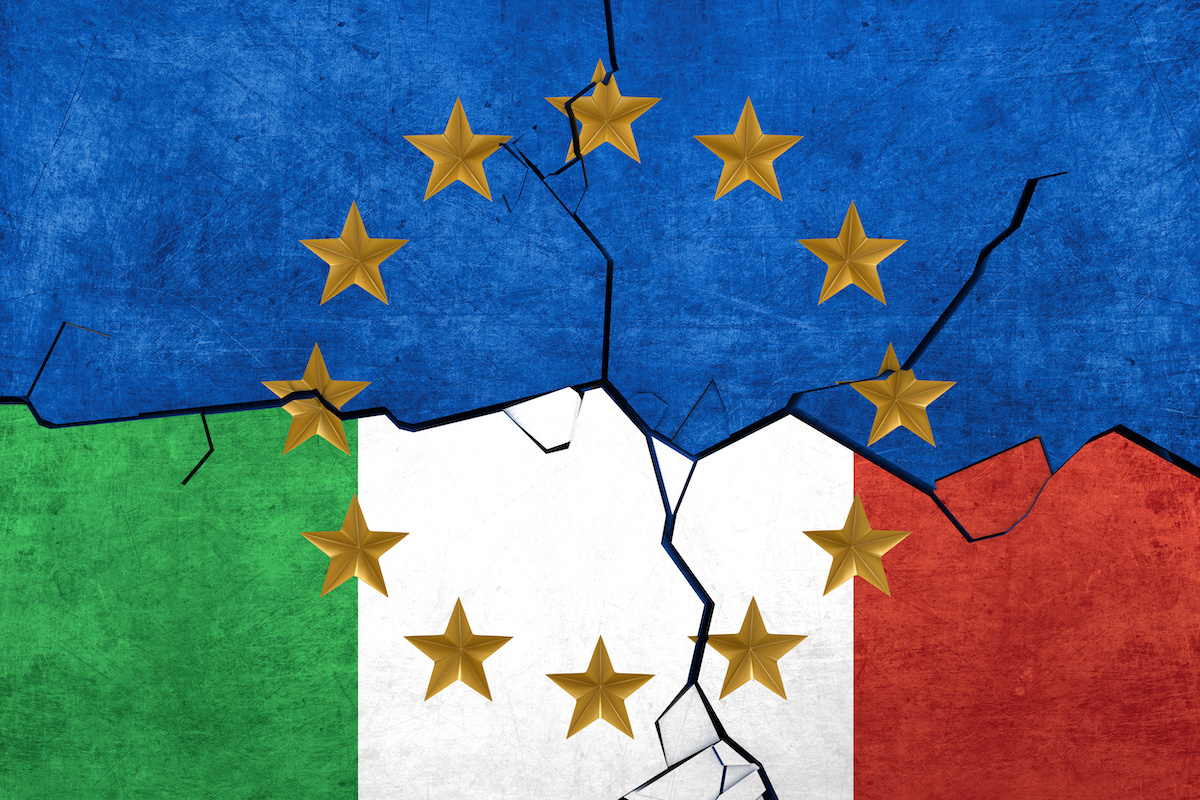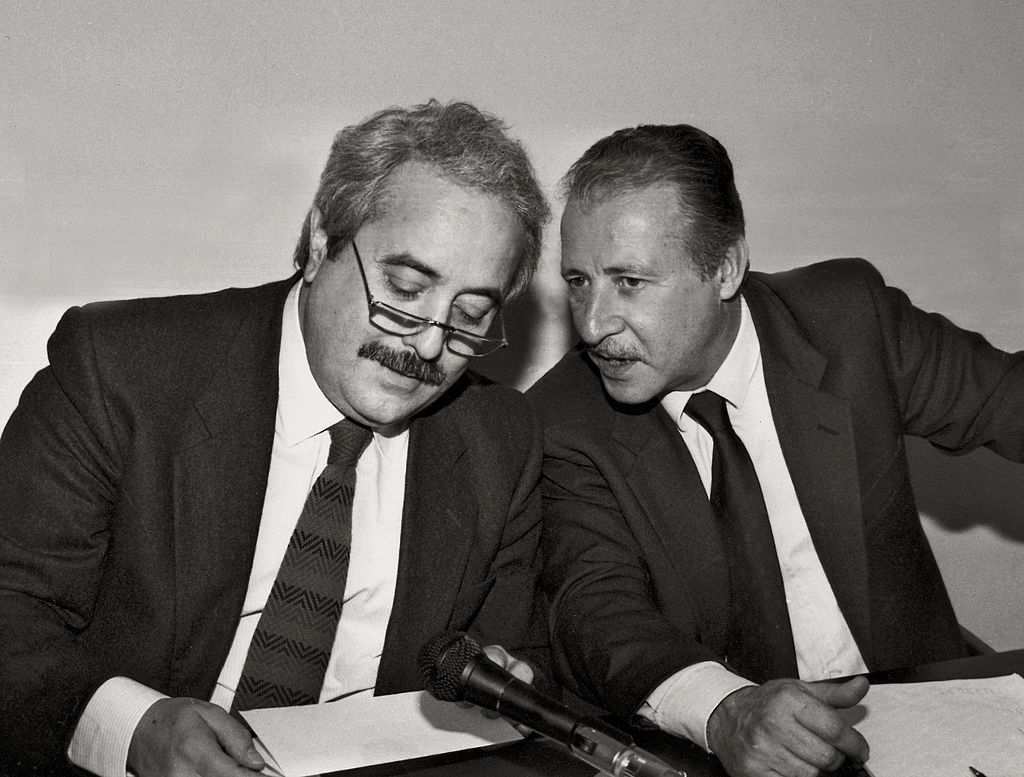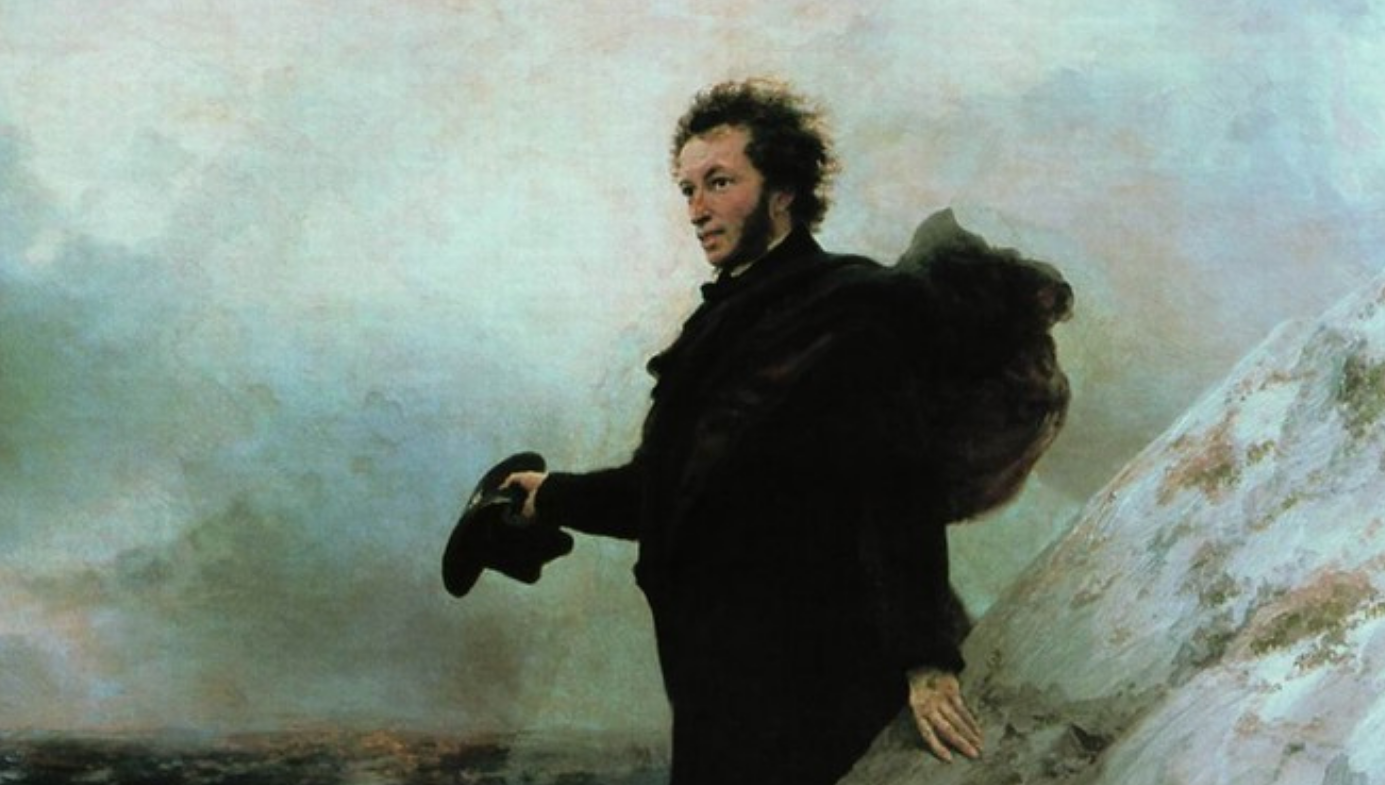COVID-19
Italy and the EU: The Hard and Stony Road Ahead
Now, both its political class and its people face a much harder road—a hard, narrow, and stony one, to end a dependence sapping both Italy and Europe.

“Too many,” said European Commission President Ursula von der Leyen on April 16th, “were not there on time when Italy needed a helping hand at the very beginning. And yes, for that it is right that Europe as a whole offers a heartfelt apology.” And heartfelt the apology probably was. For weeks, von der Leyen and her colleagues had been receiving frantic pleas for assistance from the Italian government, and little had been forthcoming. By mid-April, Italy was at last beginning to pull out of the dire circumstances that had placed it at the top of the world’s league of COVID-related death: At its grisly peak at the end of March, nearly 1,000 Italians a day were perishing from the virus, a terrible figure that will, as in other countries, almost certainly turn out to be an underestimate. It was still in great need of help—from the EU, above all—but it was no longer the worst place in the world. It was time for the EU to display some public contrition.
But, for several reasons, the apology probably came too late. Aid—in the form of personal protective equipment and doctors—was already arriving in Italy from Russia and China, prompting commentators to point out that their official enemies were behaving in a more comradely manner than their neighbours and allies. The Russian and Chinese expressions of largesse were, of course, largely propagandist gestures. China has succeeded in convincing the Italian government to host parts of the Belt and Road Initiative, and Russia is a state favoured by the leader of what is presently Italy’s most popular party, the Lega. Nevertheless, both nations efficiently exploited the opportunity afforded them by Europe’s leaden response to the Italian disaster.
Within Italy itself, meanwhile, opposition parties, long hostile to the European Union, have retained a strong lead over the government. This has been a rare phenomenon in democratic countries during this pandemic, where citizens have tended to rally round those in power who they hope can mitigate its ferocity. For two or more years before the pandemic struck, an increasing number of Italians had reversed Italy’s decades-long enthusiasm for the EU, and embraced an increasingly feverish rejection of it. In the May 2018 general election, two anti-EU parties—the Lega led by Matteo Salvini, and the Five Star Movement (5SM) led by Luigi di Maio—together topped the poll, and after three months of torrid negotiations, they formed a coalition government with smaller allies. It fell apart in August 2019 when the Lega withdrew its support. With apparent insouciance, a rightist anti-EU coalition was suddenly replaced by a leftist pro-EU coalition composed of the centre-left Partito Democratico and, again, the 5SM. The new government, like the previous one, is led by an academic lawyer named Giuseppe Conte, a figure until recently unknown to the political world, but who was pressed into service because neither Salvini nor di Maio could agree on who should take the prime minister’s seat.
Unsurprisingly, the new government, which has not sought an electoral mandate and has an unelected premier at its head, has limited public purchase. The cold shoulder from Brussels has only inflamed existing resentment and helped produce a country in which, according to a recent Techne poll, citizens are equally split between support for and opposition to the EU. “It is hard,” writes the FT commentator Wolfgang Munchau, “to overstate Italy’s dramatic turn to Euroscepticism. It will not go away when the lockdown ends.” Once the keenest European on the continent, Italians now see the EU as a contributor, and not a solution, to its chronic governance difficulties.
Salvini, leader of the Lega, and Giorgia Meloni, leader of Fratelli d’Italia (FdI), assiduously cultivate this sentiment. Presently, the Lega is polling just under 30 percent, while FdI sits at 13.3 percent. Along with the six percent polled by 83-year-old Silvio Berlusconi’s centre-right Forza Italia party, Lega and FdI have just under 50 percent in the polls. Meloni, the only woman at or near the head of a major party (ironically, one that is named “Brothers of Italy”) is still relatively young (43) and has been startlingly successful at building support, even though many FdI members remain unapologetic about their past links with fascism. Two years ago, it won just 4.35 percent of the vote in the general election; now, its support is three times that.
Italy’s Eurosceptic parties have certainly benefitted from European institutions’ apparent indifference to the Italian plight. In early March, Christine Lagarde, head of the European Central Bank (ECB), told a press conference that it was not the Bank’s task to close the spread between (high) Italian and (low) German bond yields—a popularly used indication of Italy’s precarious economy. She added that she was not about to emulate her predecessor, the Italian economist Mario Draghi, who threw every caution to the wind in support of the Euro currency. She, too, had to issue an apology, in this case to her board members, as a result of which the ECB’s position is now unclear.

The two governing parties are now polling around 33 percent between them, although support from small leftist and liberal groups might give them around 40. Prime Minister Conte, on the other hand, still enjoys majority support—he has proven to be a surprisingly agile politician, able to bear the savage pressures his office must withstand. His status as a non-party man has probably helped, not least because the violent polemics that typify Salvini’s populism now produce as much anxiety as support. But the crisis is deeper than either the polls or the death figures show, and this will only become more evident when the intensity of the pandemic abates, and the government must reckon up the damage wrought. It will be terrible. An already very high debt-to-GDP ratio of 137 percent—up 30 percent since 2010—might grow, Wolfgang Munchau thinks, to 180 percent when the vast cost of the lockdown and the closure of much of the economy are factored in. The European Central Bank will use its pandemic programme of printing apparently unlimited money to keep Italy going in the short term.
And in the long term? Every option is cruel. A deep economic, political, and financial restructuring—from tax through corruption and organised crime to wage and public spending cuts and lengthening of working time—will require a strong and stable government. None is presently available. A default, which some already think inevitable, would kill off many of the Italian banks which hold much of its debt, and also impose a harsh squeeze on incomes and public services. To leave the Euro—which increasing numbers now see as an escape in one bound—would court revolution, as a sharply devalued lire cannot pay off debts denominated in Euros and would substantially raise the cost of living.
In his 2018 book EuroTragedy, the former IMF economist Ashoka Mody argued that “an economic or financial tremor in Italy or in the global economy could open up Italy’s cracks, which could radiate earthquakes and cause damage along other vulnerable fault lines.” He could not have predicted the “tremor” that is COVID-19 ravaging the world as a whole, and Italy in particular. Saving Italy, when every other state will be hard pressed to save itself, will be top of no-one’s agenda. But leaving Italy to struggle on its own would tempt a similar fate for the Euro. Self preservation, when set against Italian travails, may force a range of previously unthinkable measures and programmes, all of which would demand that the wealthier countries finance Italy back into health. This is likely to be a long haul.
For now, “may” is the important modal verb in this scenario. The EU member states, and especially the 17 Eurozone countries, are split, and have been for years, between what might crudely be defined as the Calvinists and the Catholics. The Calvinists, which include the Scandinavians, the little Baltic states, the Netherlands, and—crucially—Germany, tend to believe that nations should behave like individuals and live within their means. That does not mean they never borrow or run up sometimes quite substantial debt, but it does mean they never allow debt to run wild or exceed the state’s ability to repay.
The strongest proponent of this view has been the German politician Wolfgang Schäuble, formerly Finance Minister and now chairman of the German parliament. Schäuble had argued against the Euro before its adoption, and in 2008 – 9, when the Greek crisis burst open and the EU was forced to assist, Schäuble refused to impose the losses on private creditors, insisting instead that the vast debts accrued were wholly Greece’s responsibility and that austerity, over many years, was the only way out. “There is no way for Greece,” he declared, “but to go down the hard, much more difficult path.” It is an echo, conscious or not, of the English Puritan preacher John Bunyan’s hugely popular 1678 tract, Pilgrim’s Progress, in which the hero, Christian, is guided to eschew the broad, easy path to the celestial city and instead choose the hard, narrow, and stony path, the only sure way to salvation.
The Catholics, on the other hand, believe in forgiveness, and that debt is necessary to provide sufficient resources for the poor and the aged (Italy’s pensions, for instance, have been prodigiously generous). The first group disapproves of the second, now led by France. In a passionate effort to warn fellow EU members that the European project is doomed without a greater show of solidarity, French President Emmanuel Macron has said that each country’s debts must become the property and the burden of all.
Were this demand to be fulfilled, the EU would evolve into what most nation states are, with a greater or lesser degree of efficiency—it would become a fiscal union, transferring resources from relatively wealthy to relatively poorer parts of the Union. Fiscal unions are generally accepted by the citizens of nation states, albeit with an increasing degree of grumbling. In the US, poor, often southern states receive more federal aid than the wealthy, usually northern states. In Germany, huge resources are still diverted to the former Communist East Germany, which continues to lag behind its Western counterpart where most of the highly competitive, export-oriented corporations are located. And within Italy itself, the poorer south is a greater beneficiary of national public spending than the wealthy and productive north. The Lega’s previous incarnation, as the Lega Nord or “Northern League,” drew substantially on resentment of the drain of tax revenues from its homeland of Lombardy, Veneto, and Piedmont in the north to Calabria, Abruzzo and Sardinia in the south. This resentment was used to justify a demand that the north separate from the rest of the peninsula, a sentiment still popular in the area.
The EU does not, of course, operate under such a system because, as Ashoka Mody writes, the northern states continue to show a “fundamental unwillingness to share tax revenues… severely limit(ing) what can be achieved.” But on April 24th, the leaders of the EU, in a virtual conference, agreed in principle to a multi-billion, even trillion-plus recovery fund to help EU members climb out of the deep craters of debt which await them all—especially Spain and Italy. The headline figures, and the agreement among the EU leaders, was welcomed, above all by Prime Minister Conte. Along with the country’s President Sergio Matarella, Conte’s support for the EU has only been fortified as Italy’s Eurosceptic parties seek to drain it of the moral and political legitimacy it enjoyed for so long. But many Italian pro-Europeans remain unconvinced, and not without reason. In a sharp column in Corriere della Sera, Italy’s (much reduced) paper of record, columnist Massimo Franco advised Italians to await “the time in which the agreement reached by the European Council is translated into concrete action… it also demands a rapid response, to define a recovery in faith in continental institutions.”

The likelihood of a rapid response, however, is remote. President von der Leyen has until mid-May to organise and define the recovery fund. This will require her to obtain a consensus between countries which see dispersed funds as grants, and those who insist they must be loans with debt strings firmly attached. Von der Leyen, an enthusiastic federalist for much of her political career (although she moderated her public view when she became president), argued at the meeting that the detailed multinational financial framework to be produced in the coming weeks would need to “counterbalance” the very large differences in fiscal health among the member states. By contrast, German Chancellor Angela Merkel, still the most powerful voice in these conclaves, told her colleagues that anything borrowed must, in the end, be repaid. Grants, she said, “do not belong to the category of what I can agree.” She cannot agree because she knows that her electorate will not tolerate it, and for this same basic reason, other leaders recoil from giving grants. Macron’s efforts to convince his colleagues to embrace that strategy requires him to defy the instincts and fears of a large part of his own French electorate. He evidently hopes that this issue will be a lever to a greater integration of the EU under French leadership, which will in turn appeal to a presently doubtful citizenry.
The next few weeks of discussions will determine Italy’s fate. They are perhaps the most consequential decisions the country has confronted since the Second World War and they are largely out of its hands. Conte has a painful spur to his sides from the junior coalition partner, the 5SM, which has announced it will not tolerate a loan of any kind, because it would mire Italy in further debt and breach its sovereignty. This will circumscribe Conte’s freedom to negotiate a compromise, under which Italy would receive a combination of loans and grants. He will endure further attacks from the Right; and possibly a further downgrading of Italy from the rating agencies. Their rating is presently BBB, and could be downgraded to BBB-, the lowest available. Yet, as Giacomo Barisone, head of public finance at the Scope rating agency, remarked, whatever deal is eventually agreed, “there is no escaping the observation that there are immediate and later-day credit implications depending on the scale of the decline in the economy and in debt sustainability.”
There is no greater decision, for Italy or the European Union, than the one which must be announced by the Commission President in mid-May. If, somehow, the Calvinists in the Union can be persuaded or frightened into propping up Italy (and Spain) until the pandemic eases and economies can gear up once more, the EU, and the Euro, will survive, at least for a time. However, Italy’s national posture of leaning on the EU as a prop will have to end. Its leaders, who have to date been unwilling or unable to convey to its citizens the gravity of its economic problems, must now explain the urgent need for hard reforms. One of the main lessons of this pandemic is that the nation state remains the only forum in which decisions about a population’s health and wellbeing can realistically be made. Success in this regard will be a much greater “miracle” than the economic miracle of the post war period, which helped modernise the country. Now, both its political class and its people face a much harder road—a hard, narrow, and stony one, to end a dependence sapping both Italy and Europe.






